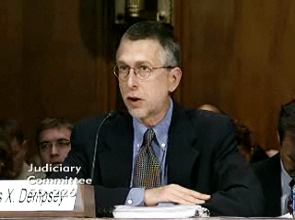Crucial Privacy Law Needs Update to Meet Demands of New Technology
 The Electronic Communications Privacy Law (ECPA), passed in 1986, was the right law at the right time; however, technologies never imagined by Congress at the time the law was passed, have become ubiquitous. However, ECPA hasn't been upgraded in any significant way since it was introduced, light years ago in Internet time.
The Electronic Communications Privacy Law (ECPA), passed in 1986, was the right law at the right time; however, technologies never imagined by Congress at the time the law was passed, have become ubiquitous. However, ECPA hasn't been upgraded in any significant way since it was introduced, light years ago in Internet time.
CDT Vice President Jim Dempsey today is testifying before the Senate Judiciary Committee on how to best reform the law so that law enforcement retains its investigative powers but also ensures that the vast amount of personal data spun off by new technologies is protected.
Dempsey's submitted testimony says:
"Today, it is clear that the balance among these three interests – the individual's right to privacy, the government's need for tools to conduct investigations, and the interest of service providers in clarity and customer trust – has been lost as powerful new technologies create and store more and more information about our daily lives. The protections provided by judicial precedent and statute have failed to keep pace, and important information is falling outside the traditional warrant standard.
"The personal and economic benefits of technological development should not come at the price of privacy. In the absence of judicial protections, it is time for Congress to respond, as it has in the past, to afford adequate privacy protections, while preserving law enforcement tools and providing clarity to service providers."
A diverse coalition, called Digital Due Process, has come together to help publicize this issue and provide guidance to Congress as it considers ECPA reform.